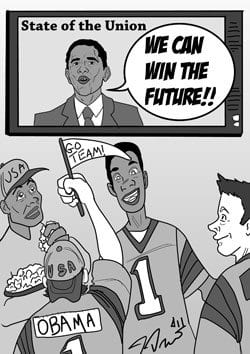
Bipartisan misunderstanding
Many Americans have long been sustained, encouraged and upheld by a belief that the United States is No. 1 in significant areas — business development, commerce, industry, finance, education, the arts and sports. For some Americans this belief is so profound that the very nature of the U.S. is so closely identified with the No. 1 standard that it cannot exist without it.
For some Americans, this point of view is considered to be an expression of their American patriotism. Consequently, any public figure willing to challenge America’s straight “A” status on any of the important issues runs a risk of generating considerable political opposition to his views.
This perspective might seem bizarre to those political activists who have been part of the opposition for some time. However, if there is ever to be a bipartisan coalition to debate public issues with civility, then the liberal opposition must understand the mindset of conservatives. It is perhaps too much to expect conservatives to cope with the converse approach.
Conservatives believe that a certain set of social values and economic strategies have been exercised to create the American success story. While there may be some potential imperfections on the fringes, too much tinkering with perfection, they believe, could be massively destructive. Similar to liberals, conservatives see themselves as embroiled in a battle for socio-political survival.
In his recent State of the Union message, President Barack Obama avoided a head-on attack on conservative concepts by speaking of “winning the future.” By placing the conflicts in a different temporal setting, Obama has created negotiation space.
It seems to liberals that conservatives still place excessive economic primacy on the concept of “free enterprise.” Every American has the right to go into business for himself without undue interference from government. In fact, some believe that private enterprise is so fundamental that it is not unreasonable for government to consider contracting out public services at a much more vigorous pace.
It is almost un-American to oppose private enterprise. Yet, the American spirit of fair play requires some form of industry regulation to prevent abuses. The anti-child labor laws, minimum wage laws and work safety provisions of OSHA have been a few significant regulations that have gained general public support.
Nonetheless, a major source of conflict between liberals and conservatives has been the pattern of regulations that affect just about every industry. Public interest groups claim the regulations are necessary to protect customers, competitors and the general public. Hard core conservatives would prefer greater reliance on the principle of “buyer beware.” These opponents of regulations falsely insist that the system of private enterprise has shifted to socialism, essentially state-owned businesses.
The greatest rebuttal to the conservative claims is that the present economic system has created the largest wealth disparity among taxpayers in the industrial world. According to a report by University of California, Berkeley economist Emmanuel Saez, the top 10 percent earning taxpayers in 2007 recorded 49.7 percent of the total wages. Saez asserts that level is “higher than any other year since 1917 and even surpasses 1928, the peak of the stock market bubble in the ‘roaring’ 1920s.”
The situation is not improving. According to Saez’s study, taxpayers with “the top one percent incomes captured half of the overall economic growth over the period 1993-2007.” It appears that the U.S. economic system is rigged to benefit the wealthy.






